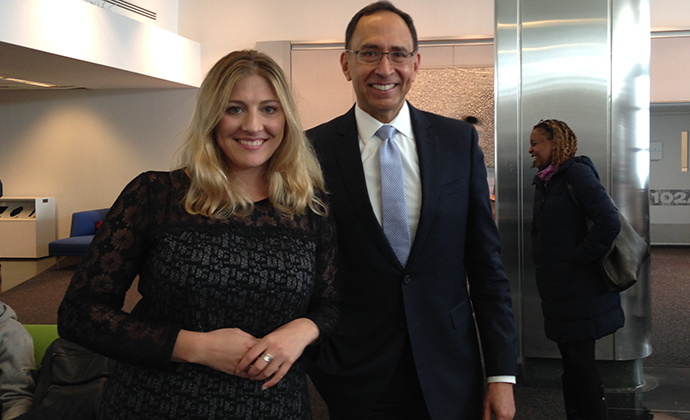Providing General Counsel on a Global Scale at the World Bank
Columbia Law School graduates and World Bank attorneys Corinne Champilou ’15 and David Rivero ’80 recently visited campus to discuss their roles at the international organization. |
When the Canadian Supreme Court issued a landmark ruling upholding the privileges and immunities of the World Bank last year, the decision was partly the result of efforts by Columbia Law School graduate David Rivero ’80, who heads up a unit of the World Bank’s legal department.
In the case, the World Bank had uncovered evidence of bribery at a Canadian engineering company working on a World Bank–funded project in Bangladesh. The World Bank voluntarily turned over documents to the Royal Canadian Mounted Police that were then used in criminal proceedings against several individuals. But when the defendants sought to obtain additional documents and depose staff from the World Bank as part of their defense, Rivero, director of the Institutional Administration unit in the World Bank Legal Vice Presidency, helped argue that the organization’s work product is privileged and, therefore, immune from discovery.
“We took the view that we could not be compelled to produce those documents,” said Rivero, who has been with the World Bank for more than 30 years. “And we did prevail in the Canadian Supreme Court.”
Rivero spoke to Columbia Law School students on Feb. 27 at “Inside the World Bank’s Legal Office—Practicing Law in an Intergovernmental Organization,” an event sponsored by Social Justice Initiatives. He was joined by Corinne Champilou ’15, a legal analyst on Rivero’s 14-person team who earned a J.D. and LL.M. in the Law School’s J.D./Master in French Law Program.
Rivero said his department is responsible for a wide array of legal activity at the World Bank, which has more than 12,000 employees and works to alleviate poverty in 189 member states. In addition to litigation, his team oversees the acquisition of office space (through leases, purchases, or new construction); internal employment matters; intellectual property; and the organization’s pension plan, among other issues.
“I like to think of it as an in-house counsel for a large, multinational corporation,” Rivero said. “We’re there not just to provide legal advice but to provide general counsel—which is a big distinction that I didn’t understand until later in life. Providing counsel means helping the decision makers understand whether something is legal or not but also, and even more importantly, whether it’s a good idea or not.” Rivero said he learned that lesson from Roberto Dañino, former general counsel at the World Bank and the former prime minister of Peru.
In an hour-long discussion in which Rivero and Champilou took questions from students, Rivero also spoke about what the World Bank looks for when it hires new attorneys. He said strong analytical skills, excellent writing, and litigation experience were top priorities. An effective lawyer, he said, helps achieve objectives rather than just outlining the law and telling people what they can’t do.
One attendee asked whether the World Bank, an institution that has benefitted from decades of globalization and that relies on cooperation among member states, would feel any effects from the rising influence of nationalist and populist movements around the world. Rivero said he didn’t know but that, for now, the World Bank is “ramping up” its operations around the world.
Champilou, who, within the World Bank’s Institutional Administration unit, focuses on Spanish-, French-, and Portuguese-speaking countries in Africa, offered some advice to the mix of J.D. and LL.M. students in the room: Get involved on campus.
During her time at the Law School, she worked with the African Services Committee—a Harlem agency that assists African immigrants, refugees, and asylum seekers—through her participation in the Law School’s Society for Immigrant and Refugee Rights. She also served on the Columbia Journal of Transnational Law staff and won the International Alternative Dispute Resolution Mooting Competition in Hong Kong. She urged students to seek out professors and to try different kinds of classes.
“Really get involved in the Columbia life—even if it’s added work,” she said. “The skills you will learn will be very useful.”
###
Posted on March 2, 2017
